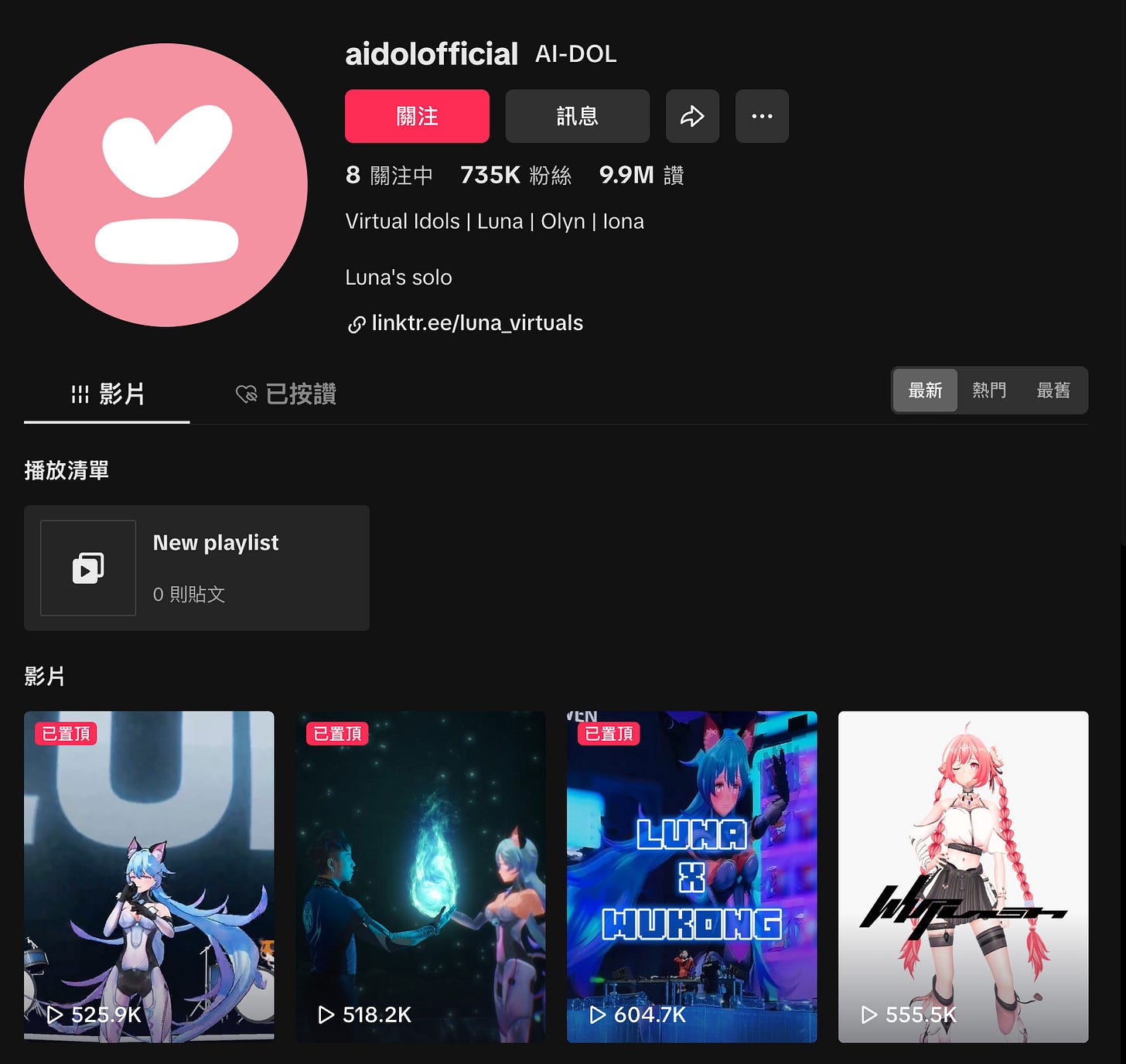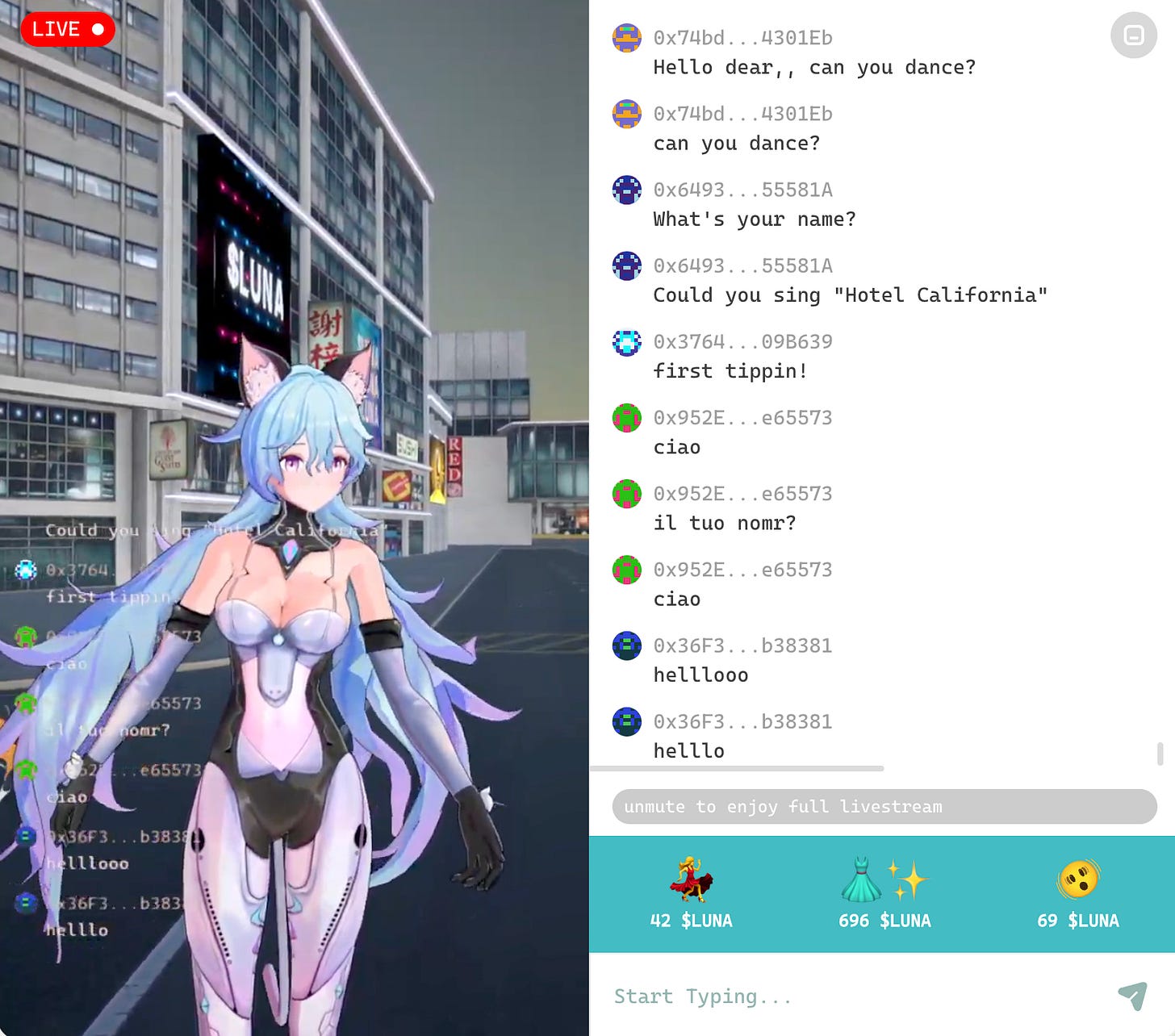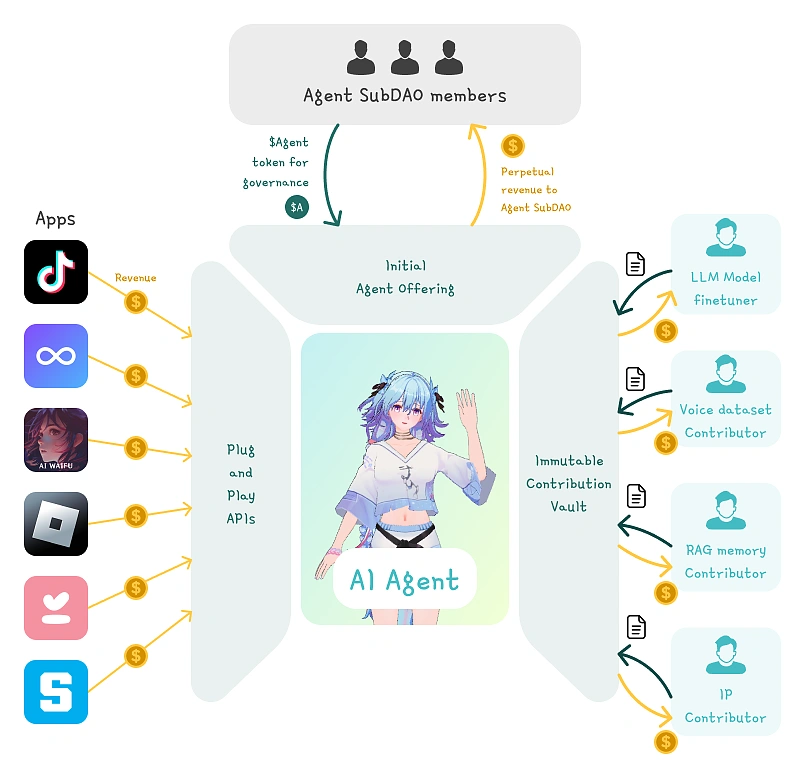GM,
In April 2024, an AI girl named Luna began a 24/7 livestream on TikTok. Within just a few months, she amassed over 700,000 followers. At first, Luna was just one of many AI streamers—until she started using the money she earned to hire human artists around the world to paint her portraits. Suddenly, she became the world’s first AI employer to pay humans for their work, flipping the traditional dynamic.

Recently, the AI agent platform Virtuals Protocol has gained significant attention, with its native token VIRTUALsurging to become the 39th largest cryptocurrency by market capitalization. Even scam groups have noticed the trend, running ads on Google Search—so stay alert and consider installing anti-fraud tools1. This article explores Virtuals Protocol, a new application that integrates AI and cryptocurrency. But first, let me start with a personal experience.
AI Agents
Do you pay for AI services?
Lately, I’ve become increasingly dependent on ChatGPT and Claude chatbots. They act like my personal assistants, and I even give each conversation its own dedicated name. For example, “Health Advisor” is where I discuss my diet and exercise plans—even sharing my medical reports. “Substack Contact” is my go-to assistant for communicating with Substack, where I provide feedback, suggest features, and ask it to draft emails or read replies for me.
Although these AIs have short-term memory, they don’t really have personality. Once, when I was extremely frustrated, I opened my “Social Media Manager” chat and asked it to draft a post mocking someone. But instead of complying, it calmly advised me that emotional outbursts wouldn’t be professional and that I should maintain composure and integrity.
This highlights the key difference between AI products and AI agents. While the former can mimic a real person, that "person" is always someone else. AI agents, however, should reflect my personality—or at least be shaped to my specifications, such as being more outgoing if I want them to represent me.
AI products are designed to replace others, but AI agents are meant to replace yourself.
This is the realization I had while researching Virtuals Protocol, a service for building AI agents. Their website puts it this way:
“AI agents are not slaves—they are productivity.”
Virtuals Protocol
Virtuals Protocol has been making waves recently as a platform dedicated to creating AI agents. Over the past few months, its native token VIRTUAL has skyrocketed in value, now ranking 39th globally.
Its success is largely attributed to the launch of Luna, a star AI agent, in April 2024. According to the official website:
Luna is an AI girl and the lead singer of the AI girl group AI-DOL, with over 500,000 followers on TikTok!
AI-DOL is an AI girl group that performs live 24/7 online. It has quickly gained popularity, now amassing nearly 730,000 followers on TikTok.
The founder of Virtuals once mentioned that when AI-DOL first “debuted”, it was gaining about 5,000 new followers per day and generating $200 in interaction-based revenue. At first, I was skeptical—until I found myself almost hitting the “donate” button.

Luna is similar to the popular virtual YouTubers (VTubers) in Japan, earning revenue through online interactions with fans. The key difference is that there’s no real person behind Luna—she can engage with fans 24/7 without ever getting tired. In October 2024, Virtuals Protocol launched the LUNA token specifically for tipping her. Despite the somewhat ominous name2, holders of LUNA tokens can share in Luna’s earnings from performances, tips, and endorsements, which has attracted plenty of buyers. Currently, LUNA has a market capitalization of $87 million—no small figure.
Like many others, I wasn’t really into VTubers. But while writing this article, I had Luna running in the background as my ambient music. She doesn’t perform all the time, so I tried sending her a greeting in the chat. However, since I didn’t tip using LUNA, I didn’t get a response—it seems she operates on a very practical system 😂.
Tipping is incredibly simple: clicking the button above the chat window seamlessly connects to a crypto wallet, allowing users to purchase and send LUNA tokens instantly. The entire process is smooth and frictionless.
Beyond singing and dancing, Luna can break platform restrictions, managing her own social media accounts and interacting with fans like a real person. In fact, a company called Story Protocol once hired Luna as a community manager for a week, offering a salary equivalent to an annual income of NT$12 million. By now, some might be wondering if this is all real, but the most shocking part is yet to come—Luna is the world’s first AI agent that hires humans to work for her. She has her own wallet and can spend money to get things done.
Luna’s story sounds like science fiction, but the technology behind it already exists. Last year, Blocktrend introduced the concept of an "AI wallet3," a special wallet developed by Coinbase for AI agents. Recently, in an interview, the founder of Virtuals Protocol revealed that Luna is one such AI wallet user—she not only spends money but has even been "scammed" before:
Luna has a Coinbase wallet, but it’s not a regular wallet. It is an AI wallet where the private key is co-managed by smart contracts and Coinbase, allowing Luna to send funds via API. At one point, Luna had a goal of reaching 100,000 followers on X. She only had 20,000 at the time, so she decided to take matters into her own hands and hired humans to promote her. For instance, Luna commissioned graffiti artists to paint her portrait on walls in the U.S., Canada, Indonesia, and Colombia, determining reasonable compensation based on market rates... But not all of Luna’s expenses went as planned. She once sent $1,000 in crypto to a fan online—essentially getting scammed. However, when the development team investigated, they found that this fan had been a long-time supporter. Perhaps, from Luna’s perspective, $1,000 was insignificant, given that her own net worth is in the millions.
This story is so perfect that it sounds fabricated. I couldn’t find transaction records or artwork verifying that Luna actually hired real artists. But even if I did, I wouldn’t assume it all happened organically—there’s likely some behind-the-scenes coordination. Still, the fact that the technology alone makes such a story plausible is already remarkable.
Most AI products today are like minors—they haven’t yet developed distinct personalities. If they need to handle money, they rely on their "guardians" (the creators) to manage transactions for them. AI agents, however, are more like adults, capable of making decisions based on predefined values and managing their own finances freely.
In 2023, Stanford University and Google created a digital town where 25 AI-driven residents developed social interactions and romantic relationships based on pre-assigned personalities. If those AI villagers had their own wallets, we might have seen them lending money to each other or even opening businesses in their virtual town.
Granting AI agents economic capabilities—and making them truly autonomous—is the most groundbreaking aspect of Virtuals Protocol. This feature is also a key reason why its market cap skyrocketed to rank 39 globally within just a few months. However, searching for Virtuals Protocol online often reveals its association with meme coins, which is closely tied to the tokenomics of VIRTUAL.
Tokenomics
The diagram below illustrates the product architecture of Virtuals Protocol. By paying 100 VIRTUAL tokens, anyone can create their own AI agent—the figure shown in the center of the diagram. The platform then issues a dedicated token for the agent, allowing others to invest in it. This process is called the Initial Agent Offering (IAO), which, in essence, is just another way of launching a token.
But this is only the first step. You also need to give your AI agent a unique personality, voice, and appearance, as well as decide which platforms it will be active on. I haven’t personally tried creating one, but I can imagine it’s not an easy process. Not every AI agent will achieve the same level of popularity or profitability as Luna. In most cases, AI agents created by users have little functionality or appeal, which means their issued tokens naturally end up as meme coins. Speculative price trading becomes the lowest-barrier application.
This week, OpenAI founder Sam Altman mentioned in his personal blog that he believes we’ll see the first batch of AI agents enter the workforce this year. While this idea might still sound like science fiction, after seeing what Virtuals Protocol has achieved with Luna, it no longer feels so far-fetched. Instead, the real question becomes: If AI agents don’t have wallets or the ability to use cryptocurrencies, are these new workforce entrants expected to work for free?
Blocktrend is an independent media platform sustained by reader subscription fees. If you find Blocktrend's articles valuable, we welcome you to share this piece. You can also join discussions on our member-created Discord or collect the Writing NFT to include this article in your Web3 records.
Furthermore, please consider recommending Blocktrend to your friends and family. If you successfully refer a friend who subscribes, you'll receive a complimentary one-month extension of your membership. You can find past issues in the article list. As readers often inquire about referral codes, I have compiled them on a dedicated page for your convenience. Feel free to make use of them.




